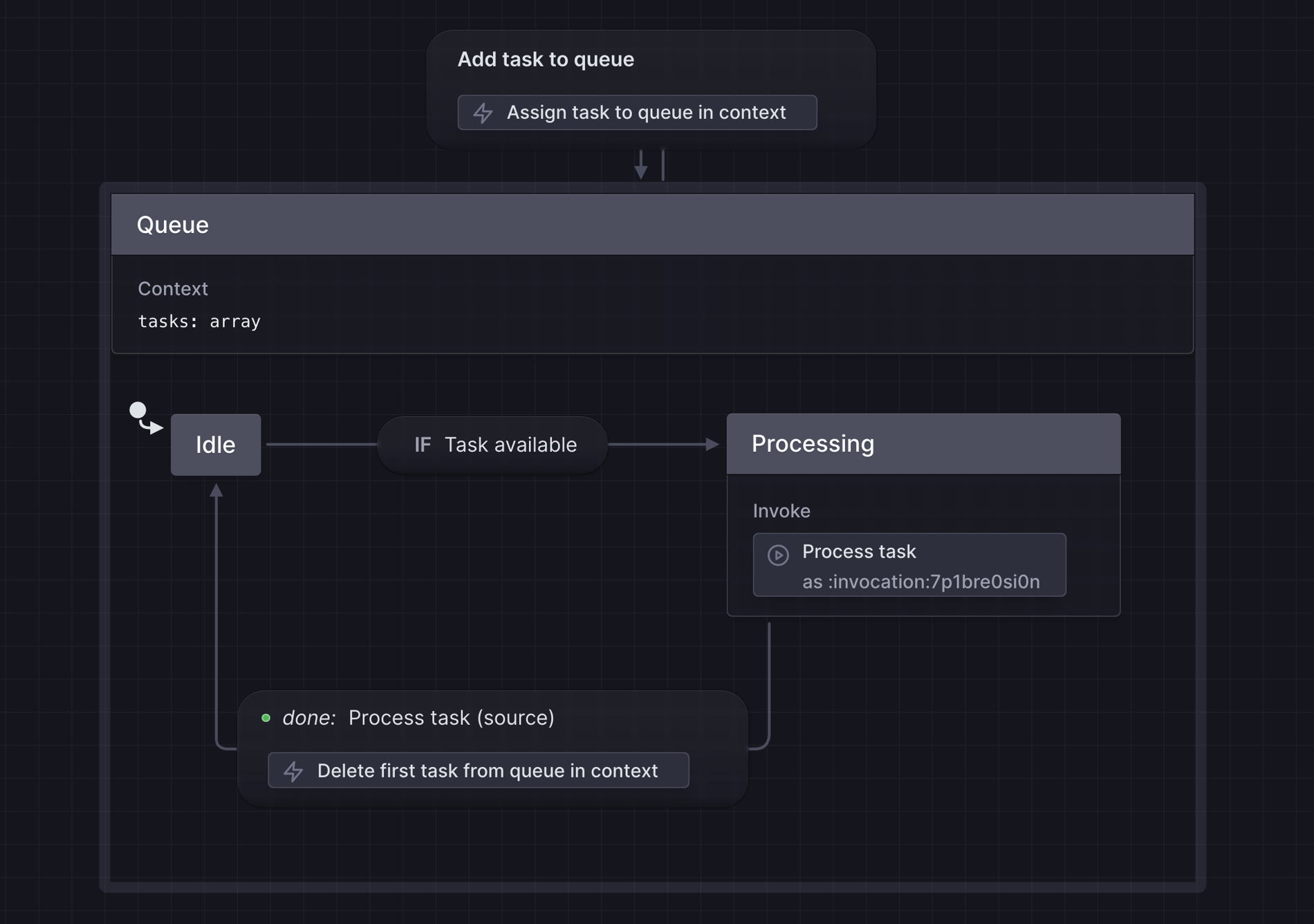#5 Unit test a state machine
Published on
Unit test state machines by leveraging their deterministic nature. Complete the coverage with integration and e2e testing.
Hey there!
According to the survey results, 37% of the respondents unit test their machines. State machines are pleasant to unit test as they are deterministic – a state machine will always behave the same when receiving the same sequence of events – and state transitions are synchronous, meaning that tests will complete fast.
State machines are configurable. Services, actions, guards, and delays can easily be mocked in tests, provided that they are referenced in the state machine definition instead of being inlined:
ts
In the previous courses, we have created state machines around a task queue that processes tasks sequentially. In this lesson, we’ll unit-test it.
permalinkAssert the initial state
For the unit tests, I use Vitest. You can use Jest, Japa, or any other testing framework. XState machines can easily be unit tested as they are just JavaScript code that doesn’t rely on browser APIs.
We’ll assert that the state machine waits for tasks to come in an Idle state. We start by mocking the Process task service:
ts
We are mocking the service because we want to test how we come to invoke it. What the service actually does doesn’t matter here. The service could be unit-tested separately as a usual JavaScript function.
Then, we must create a wrapper machine that invokes the mockedTaskQueue. The taskQueue machine uses the sendParent() action, which sends an event to the state machine that invoked or spawned it.
ts
If a state machine uses the sendParent() action while not having been invoked or spawned, XState will throw. Furthermore, we want to assert that the parent state machine receives the expected events, keeping us posted about the updates to the status of tasks.
We update the test to wrap the mockedTaskQueue machine:
ts
We start a live instance of the machine with the interpret() function. Be sure to call the .start() method; otherwise, the machine won’t process any event and will remain in its initial state.
We get the current state of the machine after it has been started with rootService.getSnapshot() function. Then, we can get the reference to the invoked task queue under the children property.
Once we have a reference to the task queue actor, we can get a snapshot and check whether the current state is Idle.
permalinkAssert the processing of a task
Testing the machine’s initial state is great, but it is more interesting to check if it processes tasks, which is its true goal.
ts
We use the vi.waitFor() function to wait for the processTaskFn() mocked function to be called by the state machine. Finally, we assert the state machine returned to the Idle state.
It’s pretty straightforward. XState unit-testing and Vitest are a great mix!
permalinkAssert parent machine receives updates
A critical feature of the taskQueue machine is that it should notify its parent machine when the status of a task is updated. For instance, the status becomes pending when the processing of the task starts.
We create another test to assert that behavior. We’ll leverage the wrapper machine rootMachine to detect whether the child sends an event to its parent.
ts
When the rootMachine receives an Update task status event, we call a mocked function – onUpdateTaskStatusFn.
We send a task to the queue, then wait for onUpdateTaskStatusFn to be called by the Update task status event. XState calls onUpdateTaskStatusFn with the usual parameters of an action: 1. the context, 2. the event, 3. the state. What matters to us is the shape of the event, which should indicate that the task’s status is now pending.
permalinkStop the machine at the end of assertions
Ideally, we should call rootService.stop() at the end of each test. This doesn’t really matter for our use case because state machines will be garbage-collected as we don’t hold references to them after the tests end. However, if the state machine ran timers in the background or performed long actions, it would be a problem and could lead to memory leaks.
To ensure the rootService is stopped after each test, we could do:
ts
permalinkWrap up
Unit testing is useful for machines that contain complex logic. This is beneficial to test edge cases or error cases. While unit testing is a good testing strategy, ensuring a state machine performs well does not guarantee that it will perform well in its natural environment. That’s why 71% of the respondents to my survey do integration and e2e testing.
Integration, e2e, and unit tests can be combined to ensure extensive and valuable code coverage. Kent C. Dodds’ Testing Trophy is a great pattern to apply to have meaningful code coverage.
I published a demo app that uses the taskQueue machine. The code is live on GitHub too.
This was the last chapter of my mini-course about XState. I hope you liked it and learned from it. Feel free to share your feelings with me.
Best,
Baptiste
